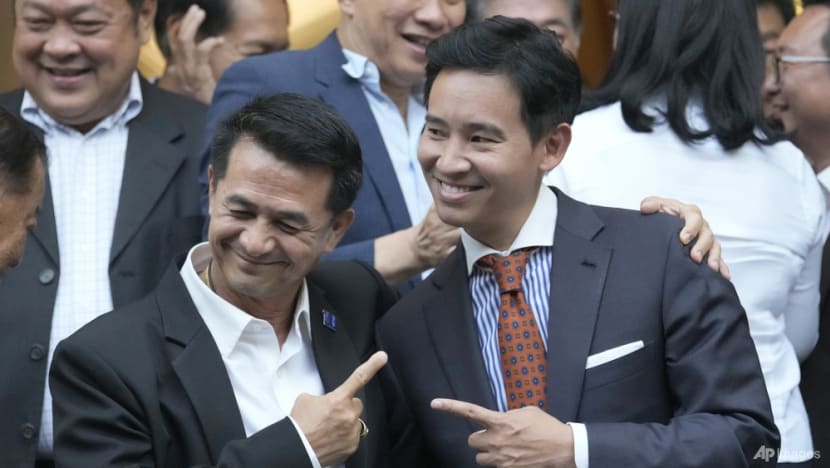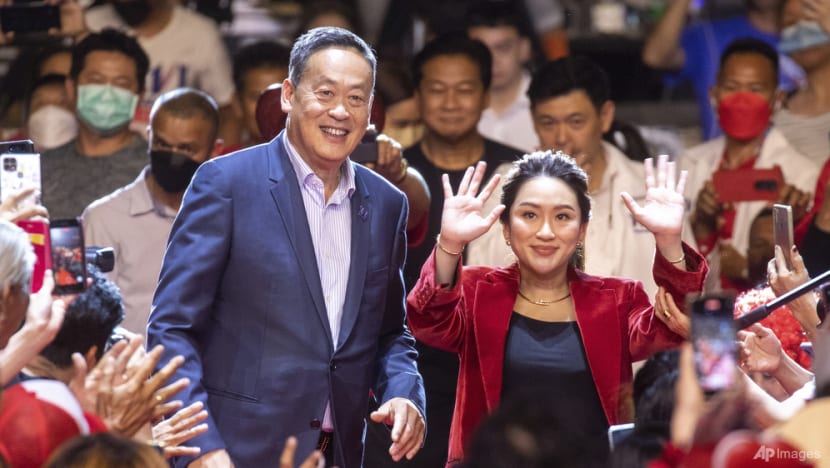Commentary: Thailand’s parliament stalemate puts Pheu Thai at crossroads
Pheu Thai’s path to political power is strewn with many obstacles and the need to make difficult compromises with erstwhile enemies, say two ISEAS-Yusof Ishak Institute researchers.

SINGAPORE: A quintessential Thai-style hung parliament has emerged after the Thai Senate twice obstructed Pita Limjaroenrat, the leader and prime ministerial candidate of the Move Forward Party (MFP), in his bid to become Thailand’s 30th prime minister.
The fiery contention between the country’s political parties has led the Pheu Thai Party to exclude the MFP as a coalition partner. The political deadlock shows little signs of resolution, as questions linger about the Senate’s readiness to endorse Srettha Thavisin of Pheu Thai as an alternative candidate.
During the first parliamentary meeting to select the prime minister on Jul 13, the Senate, which consists of 250 members hand-picked by the military government in early 2019, overwhelmingly abstained or voted against Pita’s candidacy. They accused the MFP of attempting to subvert the monarchy by campaigning to amend Article 112 or the lese-majeste law.
Consequently, the MFP-led coalition, consisting of eight parties, fell 51 votes short of a majority endorsement from the bicameral parliament (that is, 375 out of 749 votes).
On Jul 19, the Senate reaffirmed its opposition to Pita by voting against his renomination. The rationale was that Pita’s renomination constituted a motion that had already lapsed, making it ineligible for resubmission in that parliamentary session, according to Rule 41 of the parliamentary rules and procedures.
THAI SENATE OPPOSITION NO SURPRISE
The Senate’s opposition to Pita comes as no surprise, given that most of its members were appointed by the National Council for Peace and Order established after the May 2014 military coup. The Senate predominantly consists of individuals closely linked to the junta, including friends, relatives, and former members of the junta’s Cabinet, lawmakers and top active-duty military commanders.
However, the Senate’s actions in 2023 are even more undemocratic compared to those in 2019.
Back then, the military-backed coalition led by the Palang Pracharath Party secured a narrow majority in the House and the Senate (249 out of 250 Senators) merely rubber-stamped the endorsement of General Prayut Chan-o-cha as prime minister. This was despite the Thaksin Shinawatra-aligned Pheu Thai winning the most seats in the House.
In contrast, the events that have followed the May 2023 elections saw the Senate operating in tandem with referee bodies such as the Constitutional Court, exploiting its power to prevent a majority coalition from electing its preferred prime minister. This has removed any remaining veneer of democracy and has raised serious questions about the legitimacy and fairness of the political system in Thailand.
DIFFICULT CHOICES FOR PHEU THAI
The reality is that appointing a prime minister without at least some Senate support has become a challenging, if not impossible task. This has had a detrimental effect on Pheu Thai, one of Thailand’s most well-established political parties.
Known for its commitment to democratic values and opposition to military influence, Pheu Thai has been forced to navigate a difficult path and is seeking compromises that impact its core ideology.
To secure a parliamentary majority to approve its prime ministerial candidate, Pheu Thai has been compelled to seek new alliances and garner support from senators and other political parties from the opposite end of the political spectrum.
These parties include Bhumjaithai, Palang Pracharath, United Thai Nation and Chartthaipattana. However, these parties have made their stance clear, pre-emptively rejecting offers to join a Pheu Thai-led coalition as long as the MFP remains in it.
To address the challenge posed by the combined bloc of senators and Members of Parliament from incumbent government parties, Pheu Thai announced on Aug 2 its plan to form a government without the MFP and to nominate tycoon Srettha Thavisin as prime minister.
NO CLEAR SUPPORT FOR PM CANDIDATE
Yet, the crucial question remains: Will the Senate support Srettha? If not, does Pheu Thai have a viable path to secure sufficient votes without the MFP?
Amid the ongoing uncertainty, the House Speaker’s decision to postpone the parliamentary session (originally scheduled on Aug 4) to select the prime minister until there is a decision from the Constitutional Court regarding Pita’s renomination adds to the complexity of the situation.

On Aug 7, Pheu Thai announced its intention to form a coalition with Bhumjaithai, signalling an attempt to form one that excludes not only the MFP but also pro-military parties, including Palang Pracharath and United Thai Nation. Other smaller parties have agreed to join the proposed coalition but the path to power is still strewn with obstacles.
BJT has agreed to endorse Pheu Thai’s candidate with certain conditions, including that the MFP be excluded from the coalition and that the combined group will not seek to amend Article 112. Still, a Pheu Thai-BJT coalition will net just 238 seats - well under the 375 votes needed to secure the premiership.
COALITION WITH MILITARY-BACKED PARTY?
Given that Palang Pracharath leader General Prawit Wongsuwan selected most of the senators, it also remains unclear whether Pheu Thai will be able to secure sufficient senatorial support for its candidate without his backing.
Palang Pracharath has 40 seats in the bag. This means a possible Pheu Thai-Bhumjaithai-Palang Pracharath coalition, with the backing of other smaller parties, would have 278 seats - still short of the critical 375 threshold, but Prawit’s influence over the Senate could help push the coalition across the line.
At this critical juncture, Pheu Thai’s choices will significantly shape the party’s future and, more importantly, Thailand’s political landscape. It serves as a test whether the party can uphold its commitment to democratic values while navigating the challenges posed by a Senate influenced by pro-military interests.
With the Senate’s reluctance to endorse its candidate for prime minister, Pheu Thai faces a dilemma: Compromising its principles and forming a coalition with military-backed elements or pushing forward and risking potential failure.
Given that former prime minister Thaksin Shinawatra has announced a plan to return to Thailand, Pheu Thai staying out of power may not be an option. But the pursuit of power at any cost could signal the end of Thaksin’s legacy, potentially transforming Pheu Thai from a beacon of democracy into a pale shadow of its former self.
Punchada Sirivunnabood is an Associate Professor in the Faculty of Social Sciences and Humanities at Mahidol University in Bangkok, Thailand. Napon Jatusripitak is Visiting Fellow in the Thailand Studies Programme, ISEAS - Yusof Ishak Institute. This commentary first appeared on the Institute's blog, Fulcrum.















